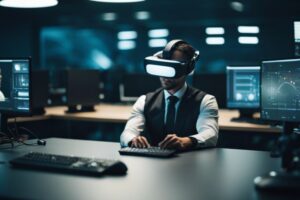Many advancements in technology have significantly transformed the way human resource functions are carried out in the modern workplace. From recruitment and onboarding processes to employee engagement and performance management, innovative HR technologies are revolutionizing the way organizations operate and manage their workforce. In this blog post, we will explore the latest trends and developments in HR tech that are shaping the future of work and changing the way businesses attract, retain, and develop talent in the digital age.
Recruitment and Talent Acquisition Innovations
AI in Candidate Screening
Screening candidates is a time-consuming process for HR professionals. However, with the advent of Artificial Intelligence (AI), this task has been revolutionized. AI-powered screening tools can now efficiently sift through thousands of resumes, identifying top candidates based on specified criteria such as skills, experience, and qualifications. By automating the initial screening process, AI allows HR teams to focus their time and efforts on engaging with the most qualified candidates.
Enhancing the Applicant Experience with Tech
Talent acquisition is not just about finding the right candidates; it’s also about providing a positive experience for applicants. With the help of technology, companies can now enhance the applicant experience throughout the recruitment process. From personalized communication and automated updates to virtual tours and interactive job previews, tech-driven solutions make the application process smoother and more engaging for candidates.
Innovations in applicant experience technology include chatbots for instant support, mobile-friendly application processes, and virtual onboarding tools that streamline the transition for new hires. These advancements not only improve the overall candidate experience but also reflect positively on the employer’s brand, attracting top talent in a competitive market.
Employee Experience and Engagement
Digital Platforms for Employee Feedback
Any successful organization values the feedback of its employees. Digital platforms have revolutionized the way companies collect and analyze employee feedback. These platforms allow for real-time feedback, making it easier for management to address concerns promptly and make data-driven decisions to improve the overall employee experience.
Gamification for Learning and Development
On the other hand, gamification has become a popular tool for enhancing employee engagement and facilitating learning and development. By incorporating game elements such as competition, rewards, and progression into training programs, employees are motivated to actively participate and acquire new skills. This interactive approach not only increases engagement but also enhances knowledge retention and application in the workplace.
Platforms that offer gamification features provide a dynamic and engaging way for employees to learn and grow within the organization. By creating a competitive yet supportive environment, employees are encouraged to take charge of their professional development and continuously improve their skills.
Data Analytics and Decision Making
Predictive Analytics in HR
With the advent of technology, HR departments are now leveraging predictive analytics to make informed decisions. By analyzing historical data and trends, HR professionals can forecast future outcomes, such as employee turnover rates, performance levels, and even training needs. This data-driven approach allows organizations to proactively address issues before they escalate, ultimately leading to a more efficient and productive workplace.
Big Data’s Role in Strategic HR
Strategic HR decisions are increasingly being influenced by the use of big data analytics. This vast amount of data enables HR departments to gain insights into various aspects of the workforce, ranging from recruitment strategies to employee engagement initiatives. By harnessing the power of big data, organizations can develop more effective HR strategies that are aligned with their overall business objectives, resulting in a competitive edge in the market.
Understanding the patterns and correlations within big data sets is crucial for HR professionals to make strategic decisions that drive organizational success. By utilizing advanced analytics tools, HR departments can identify key trends, opportunities, and challenges within their workforce, allowing them to tailor their strategies to meet the evolving needs of the business. In today’s data-driven world, the ability to effectively interpret and apply big data insights is imperative for HR professionals looking to shape the future of work.
The Future of Remote Work
Technology in Managing Distributed Teams
Many advancements in technology have made managing distributed teams more efficient and seamless than ever before. Communication tools such as video conferencing, project management software, and collaboration platforms have enabled teams to work together in real-time, no matter where they are located. These technologies help ensure that remote workers stay connected, productive, and engaged with their teams.
Virtual Reality for Immersive Work Environments
Future workspaces are evolving with the integration of virtual reality (VR) technology, offering immersive experiences for remote workers. VR enables employees to interact in virtual environments, attend meetings, collaborate on projects, and even participate in virtual team-building activities. This innovative technology not only enhances the remote work experience but also fosters a sense of belonging and community among team members.
Understanding the impact of these technological innovations in managing remote teams is crucial for businesses looking to thrive in the future workplace. By embracing these advancements, organizations can create more collaborative, flexible, and engaging work environments for their employees, regardless of their physical location.
Legal and Ethical Considerations
Privacy Issues in Employee Monitoring
Now, with the advancements in technology, employee monitoring has become more prevalent in the modern workplace. However, this raises significant privacy concerns for employees. Employers must strike a delicate balance between monitoring for productivity and protecting the privacy rights of their employees.
Ethical AI Use in HR Processes
Considerations for ethical AI use in HR processes are paramount as organizations adopt artificial intelligence to streamline operations and improve decision-making. Ethical guidelines must be established to ensure transparency, fairness, and accountability in AI-based HR systems. It is crucial to evaluate the ethical implications of AI algorithms, including biases and discrimination, to promote a healthy workplace culture.
Monitoring the ethical use of AI in HR processes involves continuous evaluation and oversight to mitigate potential risks and ensure compliance with legal and ethical standards. HR professionals need to stay informed about the latest developments in AI technology and proactively address any ethical concerns that may arise in the workplace.
Summing up
With these considerations, it is evident that technological innovations in HR are reshaping the future workplace in profound ways. From AI-driven recruitment to data analytics for performance management, these advancements have streamlined processes, improved decision-making, and enhanced employee experience. Embracing these technologies is vital for organizations to stay competitive and adapt to the rapidly changing dynamics of the modern workforce. As we continue to witness the evolution of HR technology, it is crucial for businesses to stay informed, agile, and proactive in leveraging these tools to drive organizational success and foster a culture of innovation and growth.



